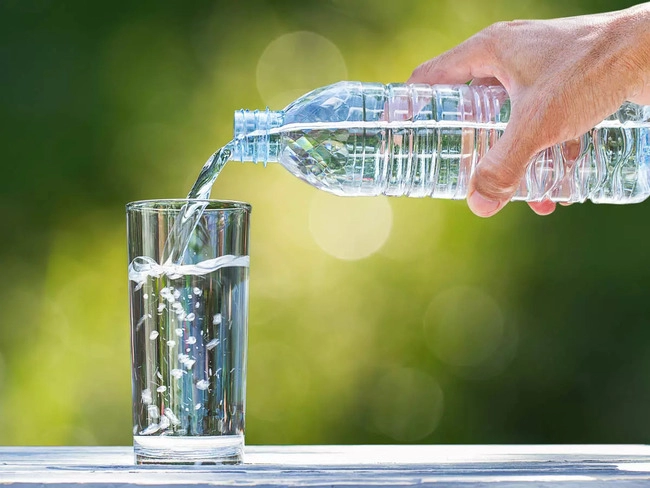Nutrition is one of the foremost requirements of our body if we are to keep it healthy, wealthy, and wise. In a time when going on diets is becoming popular, we have sidelined the importance of various types of nutrition. Of course, this is a great injustice to our bodies which thrive on several nutrients and minerals from edible products and an active routine.
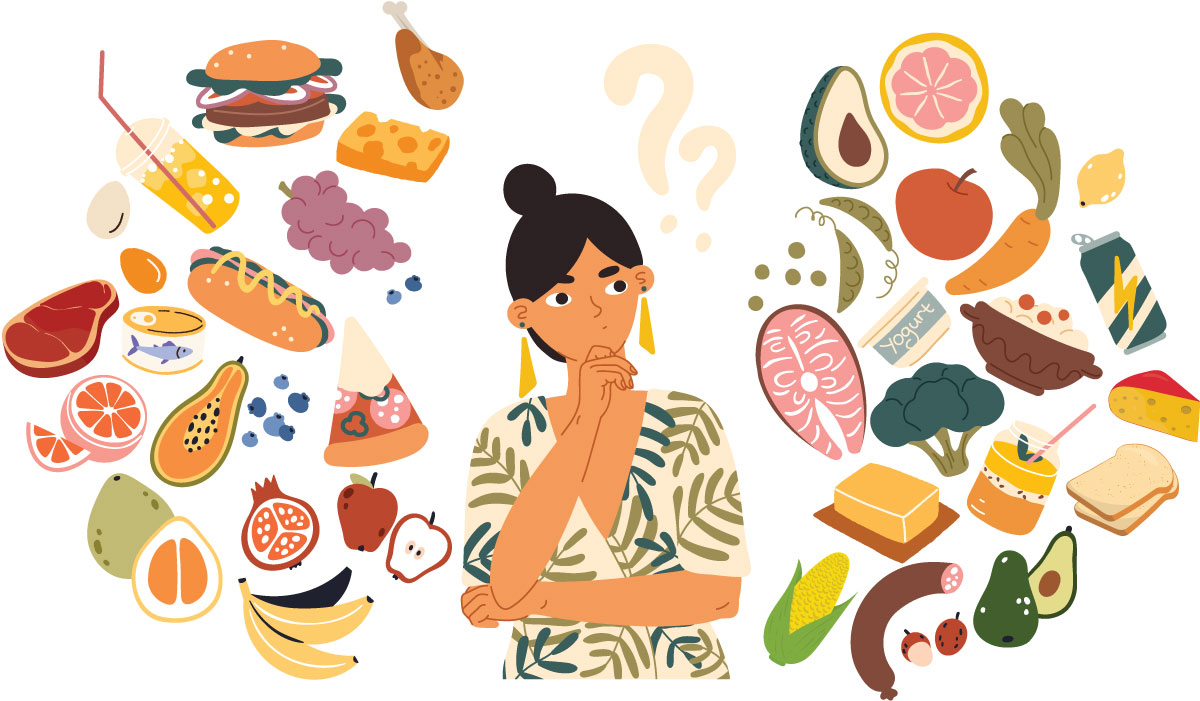
The human body is unique because of the several complex systems that make it up. These organ systems need some fuel to keep them running and active. Just like a machine, our body can break down if it does not get ample energy to keep it in good shape. It is here that nutrition comes in as our savior.
Although the current trends of superfoods tell us otherwise, even those cannot deliver their promised results in absence of a plate that is full of several types of nutrition. It is a pity that many people ignore the importance of a balanced diet, which is an essential part of living a healthy life to its fullest.
But, this is what we’re here for. We will explain to you the A-Z of types of nutrition, their importance, their sources, and other itty-bitty questions you might have in your curious minds about the wonderful world of nutrients! So let’s get started and kick off this fruitful (pun intended) journey!
What is Nutrition?
Nutrition is the process through which an organism uses food to support its development and survive. Some sources refer to nutrition as ingesting food and converting it into energy to support essential functions. Either way, it is correct however you put it.
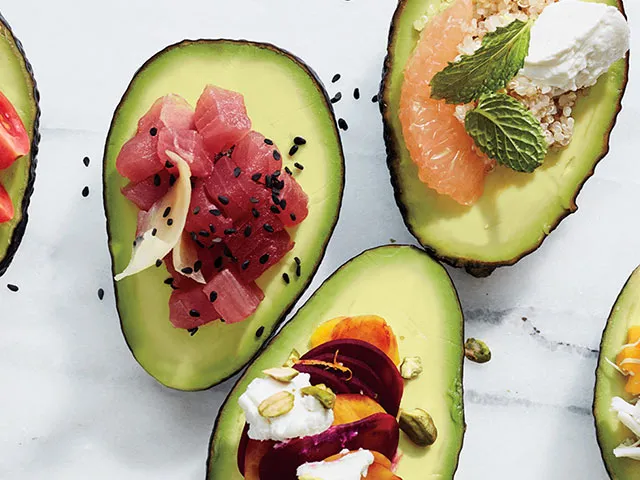
Nutrition is a complex biochemical process that involves several steps through which our body converts food into usable components that make up our body.
Food needs to be digested and absorbed by our body which breaks it down into compounds that ultimately provide us with nutrition.
Therefore, the following steps come together to form a wonder called nutrition-
- Ingestion
- Absorption
- Assimilation
- Biosynthesis
- Catabolism
- Excretion
Why is Nutrition Important? Know About the Benefits of Good Nutrition.
Proper nutrition can do wonders for our bodies. Aside from aiding the smooth functioning of our organs and skeletal structure, good nutrition has a treasure trove of benefits. Some of them are glowing skin, strong bones, and increased immunity. We have listed down the many benefits good nutrition can bring you-
- A proper diet can help you live longer and healthier.
- Eating healthy protects your heart and fights off cardiovascular diseases. Basically, you eliminate the risk of heart attacks and other maladies if your plate is full of various nutrients, vitamins, and minerals.
- A platter full of various types of nutrition can support your mental well-being. If they say that what you eat shows itself- they are not wrong. Good nutrition can leave you feeling more fulfilled, happy and healthy.
- Have you been worrying about skin elasticity at a young age? What about whitening hair? These might have causes that are skin deep- but, sometimes the fault lies in what we eat and how. This is why good nutrition in form of a balanced diet is important to keep premature ageing at bay.

Can We Derive All Nutrients by Eating One Food?
However, here is what we should know, there is no single source of all-round nutrition. There are various types of nutrition, wherein each nutrient has its own value.
A balanced diet is the right mix of all nutrients, vitamins, and minerals. Therefore, aim at having everything in balanced proportions and not the excess of a single food.

So, no matter how you wish for it, you cannot derive your proteins, vitamins, and minerals from a bowl of your favorite chips. Neither can you aim to fulfill your need for essential fats and carbohydrates by having a fruit or a glass of milk as the only meal of the day.
Main Types of Nutrition
While there can be several right answers to this question, here we divide nutrients into two main groups-
Autotrophic Nutrition
When we talk about autotrophic nutrition, we refer to organisms that are self-dependent and create their own food instead of depending on other organisms for it. Plants are autotrophs as they make their own food by the process of photosynthesis.

It is important to know that plants have their own in-built kitchens to make food from sunlight and water, unlike us humans.
Sometimes, we too wish to be autotrophs (sigh. Life would have been easy, right?), but then, it simply helps us cultivate a massive respect for the powerhouses plants are.
Plants, algae, and iron bacteria called the Acidithiobacillus ferrooxidans are some autotrophs.
There are two further sub-types of autotrophs-
Photoautotrophs
These organisms make their food from sunlight. All plants that depend on photosynthesis are called photoautotrophs.
These organisms capture photons from the sun. They then harvest the energy they get from the sunlight to aid their own biochemical processes.

They also take carbon from the atmosphere besides sunlight.
Plants use carbon to make sugars that help them store the sun’s energy. In return for CO2, they give us heterotrophs some precious O2. You can know more about this process in our article update on trees!
Chemoautotrophs
Chemoautotrophs are organisms that derive their source of energy from chemical processes.
Just like photosynthesis stands for making food from light, chemoautotrophs use chemosynthesis to survive. Organisms like Nitrobacter, Nitrosomonas, and sulphur bacteria are examples of such organisms.

Usually, chemoautotrophs are found in places where light cannot pass through easily or places that are otherwise toxic to human beings like deep-sea vents, in and around volcanoes, etc.
Heterotrophic Nutrition
Heterotrophic nutrition occurs when organisms depend on other organisms for their nutrition needs, which is mainly plant or animal matter. Remember the food chain? It is a heterotrophic cycle where organisms are dependent on each other for sustenance. This is because these organisms cannot make their own food as autotrophs do.
Heterotrophic nutrition is further classified into the following groups-
Holozoic Nutrition
This nutrition refers to the internal processing of food in an organism. All vertebrates show this type of nutrition.
However, some unicellular organisms like amoeba also display this type of nutrition. There are the following types of holozoic organisms-
- Herbivores- which are dependent on plants, like cows, deer, elephants etc.
- Carnivores- are meat-eaters like lion, tiger, wolves etc. Dinosaurs like velociraptors were carnivores as well.
- Omnivores- which depend on both plants and animal-based diets, like human beings, dogs, bears etc.
You can look at the following video to get a better understanding of the holozoic nutrition in amoeba-
Parasitic Nutrition
Parasites are organisms that get their food by feeding on other organisms called ‘hosts’. Mosquitoes, Cuscuta (known as Amarbel) are some popular parasites. Even insectivorous plants like Monkey cups, and the Venus flytrap are partial parasites.

Saprophytic Nutrition
This mode of nutrition is used by organisms that depend on the dead and decaying matter to derive their nutritional needs. Organisms like bacteria and fungi fall into this category.
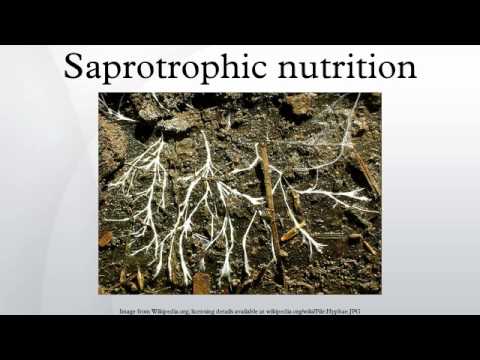
Saprophytes release enzymes on the dead matter to break their complex components into more simple nutrients to consume them easily. Saprophytes are also known as decomposers.
What are Nutrients?
Nutrients are compounds that provide nutrition. Fun fact- our body does not make essential nutrients on its own. Then how do you think we are surviving?!
This is the reason we need food. As our bodies do not have nutrients in sufficient quantities, they need them from external sources like food. Nutrients derived from food help our body regulate its chemical processes, excrete waste, reproduce, repair damaged cells etc. You can look at the following videos to look at types of nutrition and various food groups that deliver them-
There are more than 40 types of different nutrients that supply our body with healthy compounds and nourish it. While there are seven major groups of nutrients, most of these are classified into two categories.
Macronutrients
Macronutrients are the kind of essential compounds that we need in large amounts to stay in good shape. There are three macronutrients that the human body requires to maintain itself and give it energy. These are fat, carbohydrates, and proteins.
Micronutrients
Micronutrients like vitamins and minerals are required by the human body in smaller amounts than macronutrients. But this does not mean that they are not important at all. Having these nutrients in less than sufficient amounts results in deficiencies. Micronutrients can therefore be critical.
Look at this downloadable chart to know everything about vitamins and mineral deficiency.
Seven Essential Nutrients and Their Sources
We can call these broad divisions of nutrients as the big seven that keep your body going in a healthy way.
We will also tell you about the sources of these precious compounds so that you can include it in your diet to make it more balanced.
However, if you are allergic to any food source, make sure you check-up with the doctor or a dietitian who can recommend you the right food to have and keep healthy despite your allergies.
Let’s look at the kinds of nutrients that are required to maintain a healthy lifestyle–
Carbohydrates
Known as the major source of energy for our body, carbohydrates, often abbreviated as carbs, are one of the three essential macronutrients that your body needs. Carbohydrates are basically sugar molecules that are broken down into glucose.
Glucose supplies the blood cells, tissues, and organs with the energy to function. It is stored later in the liver and muscles for further use.
Whole grains, dairy products like milk and yogurt, snacks like bread, cake, cookies and pasta are excellent sources of carbohydrates.
The average adult needs at least 130 grams of carbohydrates per day. The amount of carbs you need also depends on your daily calorie requirement. There are two main types of carbohydrates-
Simple Carbohydrates
These kind of carbohydrates are broken down quickly. Sugar is a simple carb and is fairly easy for the body to digest. Sugary drinks, refined foods, and even fruits, milk and vegetables are good sources of simple carbohydrates.
Complex Carbohydrates
Starch and fiber are complex carbohydrates that are made of long chains of sugar molecules that cannot be broken down easily. They pack in more nutrients as compared to simple carbohydrates. As a result, they digest slower than their simple counterparts.
Complex carbs are found in foods like whole grains, starchy vegetables like potato, corn, and sweet potato. Grains like quinoa or buckwheat are also rich in complex carbs like fiber.
Proteins
Proteins are rightly called the building blocks of the body. It is because hair, skin, bones, muscles, and nails are made out of this wonder nutrient.
Protein composes about 16 percent of the total body weight. It is a major structural component of several hormones and antibodies that help us fight diseases.
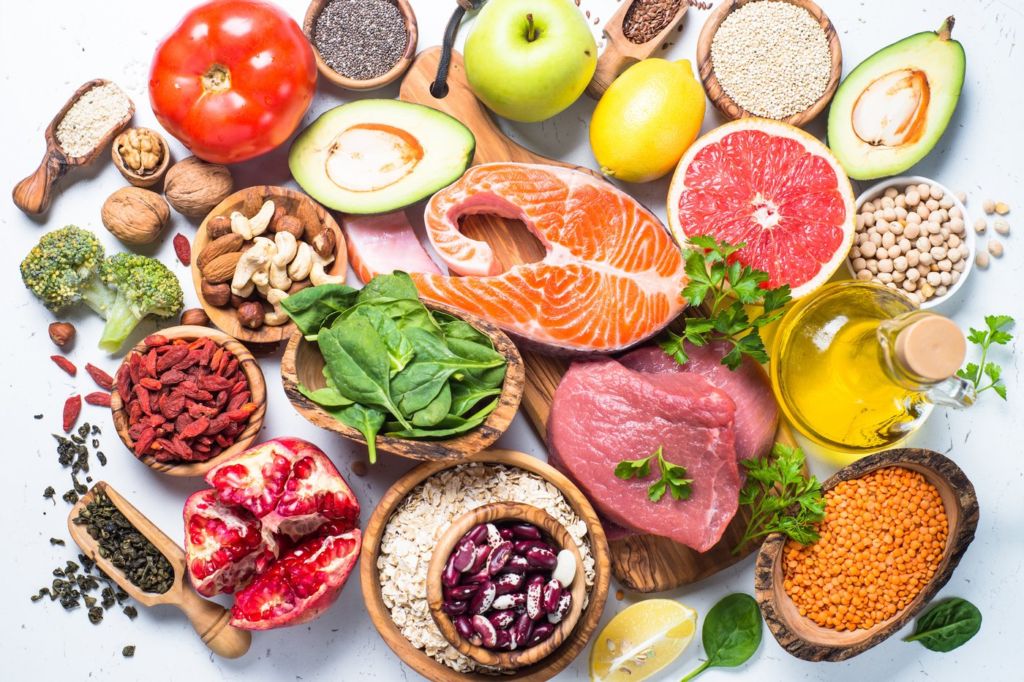
Milk, meat, legumes (called dal in India), fish, and eggs are good sources of protein. On average, a human adult needs about 46-56 grams of protein per day.
Proteins are pretty popular amongst bodybuilders as it helps in developing healthier, stronger muscles. Thus, it is also an essential nutrient for developing kids and teenagers.
Types of Proteins
These are large and complex molecules that are further divided into four types-
- Digestive enzymes like trypsin, pepsin, and amylase
- Transport variety like albumin which is the white part of a regular egg and hemoglobin, which gives blood its red color and is responsible for transporting oxygen
- Structural proteins like keratin, actin, and tubulin. Keratin makes up our hair and nails.
- Hormones which are chemical messengers that are secreted into the blood. Insulin, thyroxine, cortisol, and estrogen direct our body to perform certain functions.
Fats
Fats do not exactly have a good reputation, but they are essential for our body. Dietary fats are important to support cell function, protect our organs and maintain body temperature. They also help our body store nutrients and absorb them. They also aid the production of hormones.
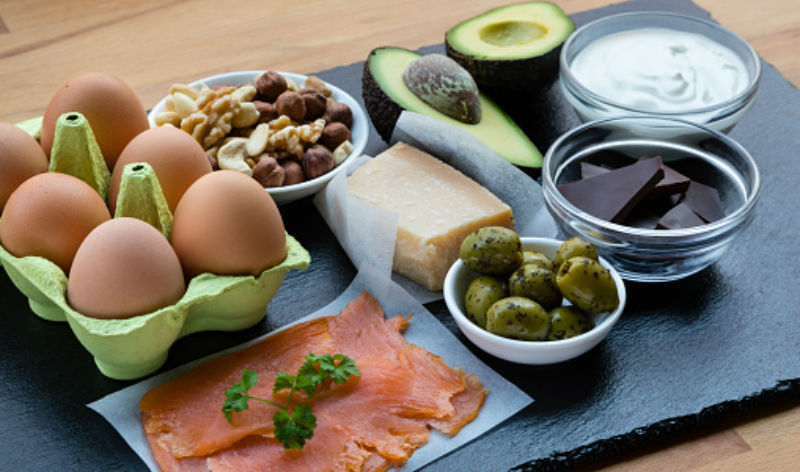
Foods like avocados, dark chocolate, fatty fish like salmon, chia seeds, and olive oil are few common sources of fats. Fats are mainly of the following types-
Saturated Fats
These are popularly known as bad fats. Because of their less than savory reputation, doctors recommend having less than 10 grams of these fats daily.
Chips, and fried finger food are few examples of food products rich in saturated fats. These fats stay solid at room temperature as they are totally covered or saturated with hydrogen atoms.
Monounsaturated Fats
These kind of fats are usually liquid at room temperature as they have simpler, unsaturated chemical bonds. Oils like olive and canola are sources of monounsaturated fats.
Polyunsaturated Fats
These are other kinds of unsaturated fats that have many unsaturated chemical bonds contrary to monounsaturated fats that have only one bond. Therefore, flaxseed, soybean, and sunflower oil are great sources of polyunsaturated fats.
Omega-3 and Omega-6 fatty acids are also types of polyunsaturated fats that are abundant in foods like fatty fish, and vegetable oils. These type of fats are known to eliminate risks of Alzheimer’s disease and dementia.
Transfats
Like saturated fats, these are also called bad fats. Although small amounts of trans fats do not do any harm, excess of such fats can raise your cholesterol levels due to the high amount of sugar and salt in them.
Therefore, you should avoid having an excess of refined foods like ramen, chips, cakes, and processed foods and try to take whole foods instead.
Vitamins
Known as the protectors of our body against various diseases and deformities, vitamins are essential micronutrients.
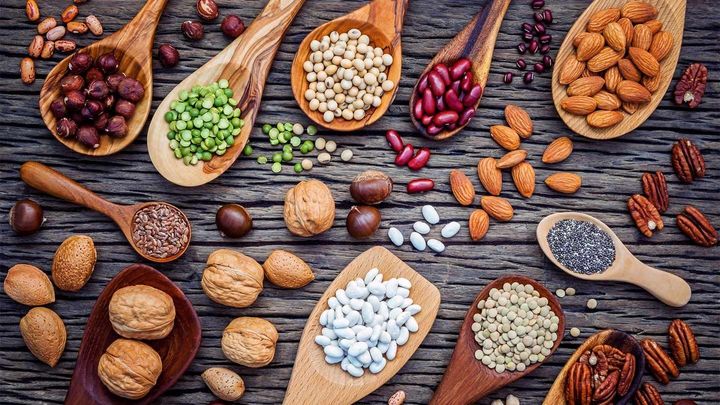
In all, there are 13 vitamins that help us fend off health problems and promote good vision, glowing skin, and sturdy bones. The deficiency of vitamins can cause serious problems like goiter, scurvy, beriberi, night blindness, rickets, and so on.
Different food items serve as sources of various vitamins. You can read about them below-
Vitamin-A
Carrots, papaya, shrimp, fish, leafy green vegetables, apricots, oranges, pumpkin, spinach, and beta-carotene-rich foods can help you promote healthy teeth growth and defend you against night blindness and dry skin. Therefore, you should have them in ample quantity.
Vitamin-B
Vitamins like riboflavin, thiamine, niacin, and folate among others collectively fall under the umbrella of Vitamin-B complex. Having dark leafy greens, poultry, potatoes, soybean, fish, fortified cereals and meat can help you pack on this group of vitamins.
Vitamin-C
To defend yourself against diseases like scurvy and boost your immunity have a lot of Vitamin-C-rich foods like lemons, oranges, chilies, tomatoes, and Brussel sprouts.
Vitamin-D
Essential for bone health, Vitamin-D is abundant in foods like dairy items, cereals, fatty fish and liver. The deficiency of Vitamin-D causes rickets which causes bow-shaped legs and other skeletal deformities.
Vitamin-E
The lack of this vitamin causes anaemia. Therefore, you should have spinach, apples, pears, nuts and seeds, and healthy vegetable oils to derive the required antioxidants and defend yourself against poor absorption of fats.
Minerals
Minerals are also a class of essential micronutrients that help in supporting the body against several diseases and deformities. They are required to aid body functions like regulation of metabolism, proper hydration and healthy growth of cells.

Minerals like calcium, zinc, manganese, magnesium, and phosphorous help in driving away sleep disorders, relieve muscle cramps, improve skin quality and achieve a balanced secretion of hormones.
Foods like pistachios, almonds, cashews, cheese, red meat, tea, and bananas are excellent sources of minerals like selenium, calcium, phosphorous etc.
Dietary Fiber
Popularly known as roughage, dietary fiber helps in the smooth digestion of food and is generally soluble. Fibers are mainly carbohydrates and help in relieving constipation and other stomach troubles. This class of nutrients keeps you fuller for a longer time as they are difficult to digest.
They are the parts of the plant that your body cannot digest-it passes relatively unchanged through your digestive canal and can dissolve in water if it is soluble.

There are two types of fiber- soluble and insoluble. Fiber can help you maintain your low cholesterol levels and ease your bowel movements. At the same time, they also aid in controlling blood sugar levels as well as achieving a healthy weight.
Thus, having whole foods like granola, oatmeal, and fresh fruits and vegetables can help you pack up on this essential nutrient and promote good gut health.
Water
Last but not the least, even water is an essential nutrient. While we can go weeks being hungry, we cannot stay without water for even three days. A crucial component of our body, water helps us stay hydrated, refreshed, improves internal lubrication, and improves brain function.
The deficiency of water is called dehydration. Dehydration can have adverse effects like long spells of dizziness, weakness and affects concentration. As our body weight is almost 62 percent of water, it is essential that we drink an ample amount of this shock-absorber fluid that helps us detoxify.
Water is required for several essential functions of our body. It is important that we have water along with food to aid smooth digestion. Proper hydration can promote platelet regulation.
Water also forms 90 percent of our plasma, which is a carrier for enzymes and blood cells. However, excess water can cause loss of electrolytes which are electric-charge carrying minerals found in our blood.
Conclusion
As we have told you about different nutrients, we expect you to incorporate these foods into your routine with proper precaution. Good nutrition is a key to a good life.
But do not forget to couple it with exercise such as sports, yoga and light workouts. Also, remember that you cannot cheat your way out of a poor diet. Thus, you should never undermine the importance of good nutrition. Because there are several people on this planet who do not get ample food, you should also be grateful towards it and not waste it.
Various types of nutrition are thus, available to help you claim your health in a good way. But take care to not to indulge in excess or too less of it. Nutrients work the best when they are in balance.
More about Nutrients and Types of Nutrition- FAQs
What is in a Protein?
Proteins are made up of amino acids, which are tiny organic molecules composed of an alpha (central) carbon atom linked to an amino group, a hydrogen atom, a carboxyl group, and a variable component, known as a side chain. Multiple amino acids inside a protein join together via peptide bonds, making a long chain. The main structure of a protein is the linear sequence of this long chain of amino acids. It is imperative to understand that proteins with varying amino acid sequences differ in terms of their structure and function.
Who is a Dietitian?
A dietitian is a qualified health professional that treats health diseases related to poor nutrition and recommends people a proper diet according to their preferences and health. Thus, dietitians are important people that help us know more about what is healthy for us and what isn’t.
What are the main 5 food groups?
The key five food groups that make a balanced diet are grains, dairy, fruits, proteins, and vegetables. Therefore, all of them should feature in our balanced diet.
Name 3 types of foods
The three main types of foods are energy-giving foods, body-building foods, and protective foods.
What does Monosaccharide stand for?
A monosaccharide is a simple sugar that makes more complex sugars like fructose, sucrose, glucose, and ribose.
How many types of foods exist?
All in all, there are 19 types of foods.
What is Malnutrition?
Malnutrition is the deficiency of essential nutrients, vitamins, and minerals. An undernourished or overnourished person suffers from malnutrition. Therefore, it is important to have all essential nutrients in the right amount to avoid such an incidence.
Is Iron a Mineral?
Iron is an important mineral that helps in defending you against lethargy, weakness, and insomnia. Other minerals like Iodine help in the proper functioning of the thyroid gland. The deficiency of iodine causes goiter.
Can an Overdose of Minerals Harm Me?
However, you can also refer to supplements along with food if you feel that it is not supplying you with your adequate mineral requirement. But always consult your doctor before anything, because overdose of minerals can also lead to disorders that can be far more severe than their deficiency.
Share with your friends
